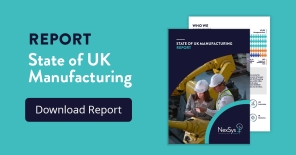4 minute read • published in partnership with NexSys
Insight: How UK manufacturing is rising to supply chain challenges
UK manufacturing has had to weather its fair share of storms in recent years. With Britain’s departure from the European Union and the coronavirus pandemic, supply chain disruption has been one of the biggest problems facing the industry.
This has contributed to inflation, coupled with the after-effects of the war on Ukraine on energy prices. Although inflation has come down substantially from the highs of late 2022 and early 2023, it remains at 2% in July which is higher than expected. Economists had forecast a slight fall to 1.9%. – posing challenges still potentially for businesses and consumers alike.
NexSys’ recent State of UK Manufacturing survey – which asked manufacturers for their views on the major issues facing the sector – covered a range of topics, including the issue of supply chain disruption and how firms have responded to it. In this blog, we’ll take a closer look at what the industry is doing to strengthen its supply chains for the future.

Picture: Getty/iStock
The scale of the challenge
Supply chains have caused UK manufacturers no shortage of headaches over the last few years. The conflict in Ukraine – still ongoing – caused wholesale gas prices, along with prices of other necessities, to rocket overnight. This prompted manufacturers to pass on their increased costs to their customers, impacting consumer demand and economic growth in general.
Prior to the invasion of Ukraine, supply chains had already showed signs of strain due to the after-effects of the coronavirus pandemic. Supplies were significantly disrupted as manufacturers were forced to shut down production for extended periods due to lockdown.
The ongoing repercussions of Brexit have also had an impact. With Britain leaving the European Union and having to adapt to a new set of trading relations with the 26 remaining nations in the bloc, there has – perhaps inevitably – been some impact on supply chains, adding to the problems facing many manufacturers in the UK.
Optimism persists
Our State of UK Manufacturing survey found that there was considerable optimism at how manufacturers had adapted, however. Nearly seven out of 10 respondents (69.64%) said they felt UK manufacturers had responded ‘quite well’ to challenges arising from Brexit and supply chain disruption, while 10.71% said they felt the industry had adapted ‘very well’.
Likewise, 35.8% responded in the affirmative when asked whether UK manufacturers were doing enough to make their supply chains more resilient against future shocks, compared to 21.4% who felt that they weren’t.
Bolstering supply chain resilience
Our survey indicates that manufacturers are taking a range of proactive steps to make their supply chains more resilient against potential future disruption. Two thirds, or 66%, reported that they were diversifying their suppliers in order to insulate themselves from future supply shocks.
Six out of 10 (60.7%) respondents said they were reviewing their procedures in response to the supply chain disruption of recent years, while just over half (51.8%) said they were investing in new technology.
While 59% of manufacturers who participated in our survey said that supply chain disruptions had not impacted which markets, they sold their products in, almost half (48.2%) said that it had affected where they source supplies from. Despite this, only 28.6% said they were sourcing more products locally or domestically than 12 months prior, compared to 48.2% who said they were not.
Reshoring: myth or reality?
There has been much debate in the media, particularly the business press, about the prospects of reshoring – that is, bringing production back to the UK from overseas. Rising costs, the pressing need to improve environmental sustainability and heightened geopolitical tensions have led some to speculate that this could be a major trend for manufacturers in the years ahead.
However, our survey indicates that reshoring is not currently a priority for most manufacturers, only 10.71% of whom said they were reshoring production by bringing it back to the UK – an indication, perhaps, that this much-hyped trend is not yet as pronounced as some have predicted.

Picture: Getty/iStock
The outlook ahead
While uncertainty remains regarding the UK’s economic outlook, there are some signs of improvement with inflation falling substantially lower than previously, and although the UK economy entered a technical recession in Q4 of 2023, observers generally expect it to be shallow and short-lived.
It could be argued that this is, at least in part, testament to the resilience and ingenuity of UK manufacturing, which has continued to play its part as an engine of growth even against a backdrop of broader economic weakness.
Nevertheless, challenges are likely to persist throughout the year. Disruption to Red Sea shipping due to the ongoing Middle East conflict may affect some supply chains.
What manufacturers will want to see from the next government is a recognition of the industry’s role in hauling the UK economy back into positive territory, with policies to support its growth in the years ahead. UK manufacturing will be waiting to see what the Labour party have to offer.

